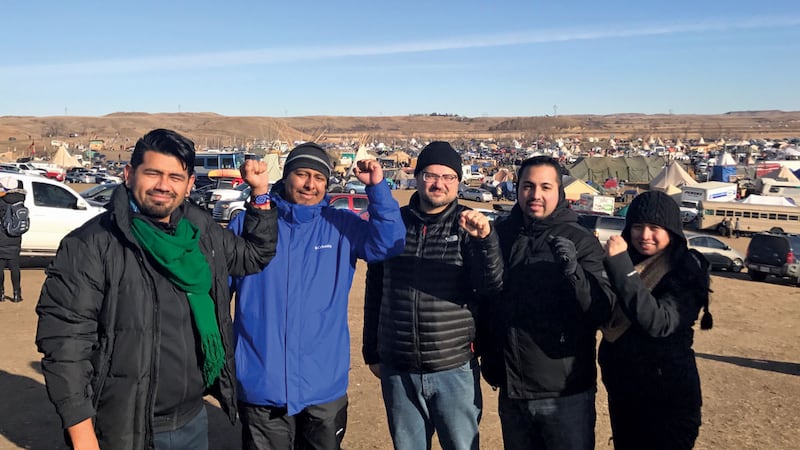Photo caption: from left to right, Josué Peña Juárez, Orlando Lopez, the Rev. Joseph Santos-Lyons, Rep.-elect Diego Hernandez and Alejandra Barragan, at the Oceti Sakowin Camp, part of the Standing Rock protest in North Dakota over the Thanksgiving weekend.
On Thanksgiving Day, state Rep.-elect Diego Hernandez (D-East Portland) took a stand.
Hernandez, 29, was elected in November, becoming Oregon's youngest legislator. Last week, he joined in a national protest movement, delivering winter supplies to demonstrators camped along the Missouri River near the Standing Rock Reservation in North Dakota. Thousands of protestors, led by seven Sioux nations, are trying to block completion of the Dakota Access Pipeline.
Hernandez and a group of 11 people brought the Standing Rock protesters sleeping bags, solar chargers, warm hats and gloves that they paid for or collected. They stayed with the demonstrators for three days at the Oceti Sakowin Camp. (Oceti Sakowin means "Seven Council Fires," because this is the first time all seven Sioux nations have come together since 1876.)
While Hernandez was there, the U.S. Army Corps of Engineers issued a Dec. 5 deadline to empty the massive camps that have been home to water protectors blocking the oil pipeline’s completion.
After returning to Portland, Hernandez spoke with WW about finding Wi-Fi in North Dakota, the looming confrontation with the feds, and how Portlanders should—and shouldn't—try to help.
WW: What made you want to travel to Standing Rock?
Diego Hernandez: Joseph Santos-Lyons, who's executive director of Asian Pacific American Network of Oregon, came up with a plan to go during Thanksgiving. I have a tradition with my family to always spend time together on Thanksgiving, so I had to disappoint my mom, but I knew it was the right thing.
What surprised you?
How close the campsite is to the bridge, where all the violence has been happening. And then all the militarized police.
We've heard there's a fence near the protest covered with different banners. Were there any that grabbed your attention?
Yeah, there was one, because it was an SEIU 503 one, from Portland [the local chapter of the Service Employees International Union]. We were all pointing at it like, "Oh, look!"
The announcement that the Army Corps of Engineers plans to shut down the camp Dec. 5 came while you were still there. What was the reaction to that?
The tribal council has a whole legal team, a legal tent. So they obviously dealt with statements to respond to that Army Corps letter. But as far as the conversations on the ground, there's actually a lack of cellphone reception and access to internet. People on the outside world find out about things before we do. So it's funny: I was sitting at the Two Spirit Nation campfire, and one of the leaders was like, "I find out about things through my cousin, who isn't here." People ask, "Did you hear about this?" and that's how the information spreads. And then we all try to look it up, go up to the hill to try to get reception.
Oh, there's like a Wi-Fi hill?
Well, not Wi-Fi, but I think they do call it Internet Hill. Throughout the day you do see a lot of people up there.
So do you think people will try to stay?
People are definitely going to stay. They're willing to battle it out, if you will, in a peaceful manner. If they're going to get evicted by force, then they're going to stay there and be evicted by force. Just to be clear: There's definitely principles for direct action, and everything is nonviolent. And it is sacred land, so there is no alcohol and no drugs, it's not permitted. And because it's sacred land, there's also no cursing, which was very hard for me. It's about respect, but also when you're on sacred land, when you talk, you're praying.
A lot of people in this city are sympathetic to what is going on. Do you have any recommendations for the best ways Portlanders could help?
There’s an action planned for Dec. 4 and 5, to do a sit-in and stand-in at the Army Corps of Engineers office in downtown Portland. That’s one way. Another is, the Oceti Sakowin Camp has a website where people can donate money.
What if people want to do what you did and visit?
Joseph Santos-Lyons recently posted something on Facebook around the influx of non-native visitors. He posted some ground rules, which have gotten a lot of shares.
Can you describe those rules in your words?
Be prepared. Have intention for why you are going, in a way that is indigenous-centered. This isn't Burning Man—you are entering sacred land.
